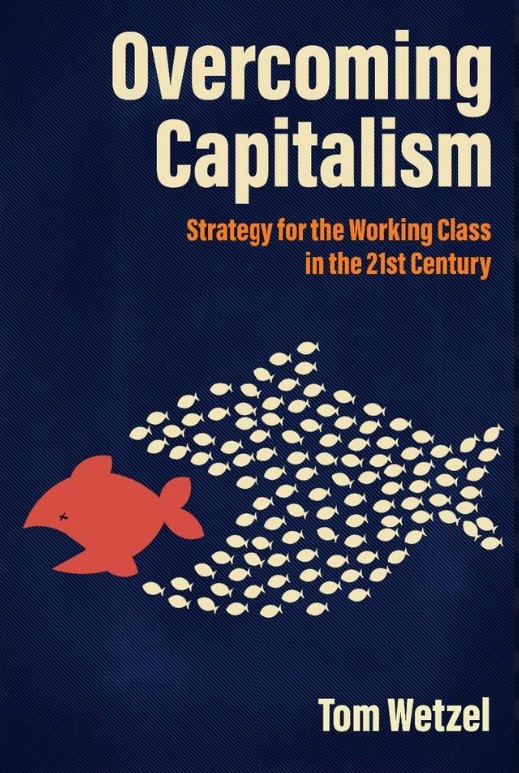By Tom Wetzel
This is a reply to the review of Overcoming Capitalism by my friend Chris Carlsson in The Fabulist (https://fabulistmagazine.com/so-you-think-youre-an-anarchist-review/).
Says Chris:
“This is one of the more frustrating shortcomings of Wetzel’s book. He pays lip service in many places to the ecological crisis, but at no point does he discuss the overwhelming necessity of completely redesigning how we work, what we do, how we interact with nature, and how a radical reimagining of our material well-being is unavoidable. His argument about increasing efficiency allowing for damage-free “growth” is problematic, and I wondered if he’d heard of Jevons Paradox. This concept refers specifically to the idea that falling costs through increased (“throughput”) efficiency actually drives up aggregate demand for the product, ultimately leading to a greater ecological burden than before the new efficiencies were achieved. “
First, of all I do actually talk about how work would be radically changed:
“A twentieth-first century form of self-managed socialism would be a horizontally federated system of production that can implement planning and coordination throughout industries and over a wide region. This would enable workers to:
- Gain control over technological development,
- Re-organize jobs and education to eliminate the bureaucratic concentration of power in the hands of managers and high-end professionals, develop worker skills, and work to integrate decision-making and conceptualization with the doing of the physical work,
- Reduce the workweek and share work responsibilities among all who can work, and
- Create a new logic of development for technology that is friendly to workers and the environment.”
This is in Chapter 5 on the ecological crisis, entitled “Cost-shifting”. I also discuss the capitalist degradation of work extensively in Chapter 3, “Working More Now But Enjoying it Less?” But Chris says he didn’t bother to read the first five chapters.
Moreover, as Chris says, we’re friends and we’ve debated for years. Chris is not just for a radical revamping of work — as I lay out here — he’s “anti-work.” There is “too much work” he tells me. But humans want things. If you are proposing not to produce them in your proposed social scheme, lots of luck in getting them to go along. There are kinds of work I do propose to get rid of — read the quote above. The kinds of work that the corporate bureaucratic apparatus does, for example, as with the things David Graeber calls “bullshit jobs.”
Chris is radically confused about efficiency. He confuses ecological efficiency with economic efficiency. You’ll notice he doesn’t discuss how I define “ecological efficiency.” First, we need the concept of throughput. This is the total of natural resources and damaging emissions from a production process. At present capitalism generates ecologically damaging emissions because they can treat nature as a free sink — they don’t have to pay for it. For example, a power firm burns coal and the emissions damage people’s respiratory systems and contributes to global warming. But the power firm doesn’t have to pay for it.
So the idea of putting the masses directly in control of use of the ecological commons is precisely to prevent this. They can ban emissions outright, or demand reductions, under my conception of self-managed socialism. Through demands for reductions, prices for emissions will fall out (I’d suggest reading Robin Hahnel’s discussion of this in Economic Justice and Democracy). Hence production organizations will have to add these in to their balance sheets, and this raises prices of things that are more ecologically damaging. Why would there be more demand for things that have rising prices?
So the idea of putting the masses directly in control of use of the ecological commons is precisely to prevent this. They can ban emissions outright, or demand reductions, under my conception of self-managed socialism. Through demands for reductions, prices for emissions will fall out (read Robin Hahnel’s discussion of this in “Economic Justice and Democracy”). Hence production organizations will have to add these in to their balance sheets, and this raises prices of things that are more ecologically damaging. Why would there be more demand for things that have rising prices?
The problem is Chris’s economic illiteracy. Where the Jevons Paradox arise — allegedly — is if you increase economic efficiency (NOT the same as ecological efficiency) — such as a more efficient dishwasher — it costs you less to operate. Now as it so happerns, Jevons Paradox doesn’t actually hold. Let’s suppose the efficiency of dishwashers or clothes washing machines is improved. Then it will cost you less (less energy consumed) to wash dishes or clothes. So does this mean people are going to suddenly be running dishwashers more than they need? Why would that be? Economist Robert Pollin discusses this is “Greening the Global Economy” and refutes this criticism.
The problem is Chris’s economic illiteracy. Where the Jevons Paradox arises — allegedly — is if you increase economic efficiency (NOT the same as ecological efficiency) — such as a more efficient dishwasher — it costs you less to operate. Now as it so happens, Jevons Paradox doesn’t actually hold. Let’s suppose the efficiency of dishwashers or clothes washing machines is improved. Then it will cost you less (less energy consumed) to wash dishes or clothes. So does this mean people are going to suddenly be running dishwashers more than they need? Why would that be? Economist Robert Pollin discusses this is Greening the Global Economy and refutes this criticism.

